May 2010
May 2010 sadmin2010 WORLD CUP A GRASSROOTS BOOST FOR SOUTH AFRICAN FOOTBALL
2010 WORLD CUP A GRASSROOTS BOOST FOR SOUTH AFRICAN FOOTBALL sadmin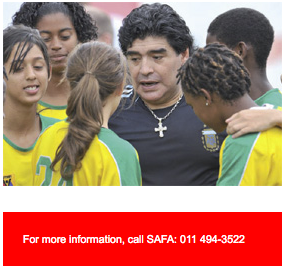 South Africa's hosting of the 2010 FIFA World Cup will have long-term benefits for football in South Africa. As part of the 2010 Legacy Project, a national programme of grassroots football development will be set up immediately after the World Cup. The grassroots football development programme will focus mainly on schools.
South Africa's hosting of the 2010 FIFA World Cup will have long-term benefits for football in South Africa. As part of the 2010 Legacy Project, a national programme of grassroots football development will be set up immediately after the World Cup. The grassroots football development programme will focus mainly on schools.
The programme will be run by the South African Football Association (SAFA) in partnership with the Department of Sport and Recreation and the world football controlling body, FIFA.
Dedicated staff
The commitment to develop grassroots soccer follows a two-day SAFA meeting earlier this year on Robben Island in Cape Town.
SAFA will appoint dedicated people to be responsible for grassroots football at all levels. In addition, SAFA will also identify Legacy Projects linked to the programme.
The association will then apply for FIFA Goal Project Funding for the SAFA School of Excellence.
Football turf
FIFA Goal Project Funding helps many national football associations to put up much-needed facilities in their countries throughout the world to develop the game of football.
The new national grassroots football development programme will also help existing programmes launched last year.
Among the programmes launched last year is the construction of football turf, which is part of the 2010 FIFA World Cup Organising Committee Legacy Project.
It is South Africa's biggest grassroots football development programme.
The football turf sites will be in deep rural areas with the main aim of encouraging everyone to play and enjoy football. This will help to boost football throughout the country.
Proper pitches
At first, there will be only nine sites - one in each province. A further two sites per province will be identified later.
Following this, and depending on additional funding, the remaining sites will be identified until all 52 sites have been developed.
"For the first time in their lives, thousands of our young soccer players will be able to play the game they love on proper football pitches," said 2010 Organising Committee Chief Executive Officer, Danny Jordaan.
"This can only mean well for the quality of football and footballers that will be produced from this project."
Education centres
Each of the 52 sites will have a clubhouse with a small education centre. The centres will have computers where education, life-skills, leadership and health programmes will be offered as part of youth or community development programmes.
"We call on these communities to take pride and ownership of these facilities, to look after them and to ensure that they are used to their benefit," said Jordaan.
- Mbulelo Baloyi
2010 WORLD CUP A SOUTH AFRICAN JOURNEY OF DISCOVERY
2010 WORLD CUP A SOUTH AFRICAN JOURNEY OF DISCOVERY sadmin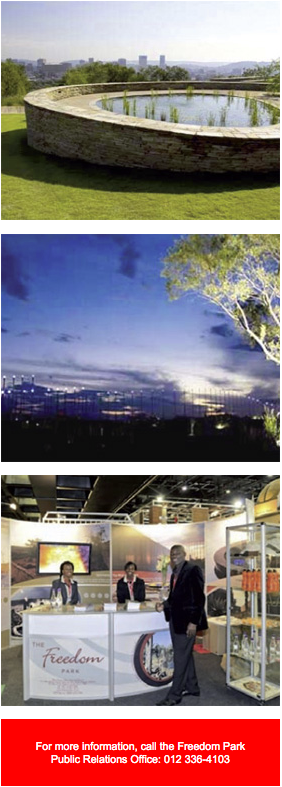 Many of the visitors expected in South Africa for the month-long World Cup, will be interested to know more about South Africa's history. This includes the story of the birth of our country's democracy. At Freedom Park, visitors will be greeted in true African fashion and taken on a journey of discovery.
Many of the visitors expected in South Africa for the month-long World Cup, will be interested to know more about South Africa's history. This includes the story of the birth of our country's democracy. At Freedom Park, visitors will be greeted in true African fashion and taken on a journey of discovery.
To tell visitors more about South Africa's road to freedom and democracy, Freedom Park has put together a programme for visiting football fans. Situated on Salvokop in Pretoria, Freedom Park stands as a museum to what South Africans have achieved as a nation.
Ancestors
Using South Africa's culture, heritage, history and spirituality, Freedom Park tells our stories and honours the loyalty and dedication of South Africans who fought and died in the different struggles for freedom.
Freedom Park is not only a tourist destination. It helps us as South Africans to learn about our shared heritage, experience and appreciate our history and to walk where our ancestors once walked.
Four areas
The park is divided into four main areas, each area showing a different aspect and serving a specific purpose.
The areas are Isivivane, and iSikhumbuto, the Wall of Names, the amphitheatre, sanctuary, eternal flame and the //hapo which is a Khoi word for dream.
Isivivane is a spiritual place, a final resting place for those who died fighting freedom and liberation in South Africa.
The iSikhumbuto is the main memorial, which tells us about the most important conflicts in South Africa's history and honours those who died fighting for freedom during these conflicts.
Wall of names
Within iSikhumbuto, there is the Wall of Names on which the names of South Africa's heroes and heroines who died fighting for humanity and freedom during the major conflicts in South Africa's history.
These conflicts include pre-Colonial wars, slavery, genocide, wars of resistance, the South African War against the British, the First and the Second World Wars and the struggle for liberation.
The Amphitheatre is used for national events and celebrations such as Freedom Day and Reconciliation Day.
The Sanctuary is a quiet place where visitors can go to think or to pay respect to their loved ones who passed on. The Eternal Flame is for heroes and heroines who died without their names being recorded.
Sharing a dream
The //hapo is an exhibition space where the story of Southern Africa dating back 3,6 billion years. // hapo forms part of the last phase of Freedom Park and its name is taken from the Khoi proverb: // hapo ge //hapo tama /haohasib dis tamas ka ibo. This means a dream is not a dream until it is shared by the entire community
- Mbulelo Baloyi
2010 WORLD CUP AFRICAN HOSPITALITY AT ITS BEST
2010 WORLD CUP AFRICAN HOSPITALITY AT ITS BEST sadmin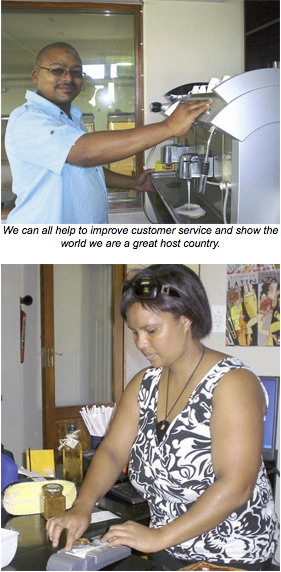 South Africa is the proud host of the biggest sporting event the African continent has ever seen. To ensure that we are the greatest hosts the world has ever seen, the Department of Tourism has launched a service delivery drive leading up to the World Cup.
South Africa is the proud host of the biggest sporting event the African continent has ever seen. To ensure that we are the greatest hosts the world has ever seen, the Department of Tourism has launched a service delivery drive leading up to the World Cup.
The Tourism Service Excellence Campaign was started to take service excellence in the tourism industry to greater heights. This is to ensure that our visitors experience African hospitality at its best.
The drive aims to improve overall customer service, to show the millions of guests expected for the games what warm, African hospitality is all about.
Service excellence
By improving the skills of employees in the service and tourism industry, tourists' experiences in South Africa will be more pleasant. This will encourage them to visit our country again and to recommend it to their friends and fellow countrymen as a great place to visit.
To achieve this, the service excellence campaign teaches employees to be more efficient, friendly and helpful to visitors and make their stay a pleasant one in whatever way they can.
Goals
The short-term goal of the drive is to deliver memorable and unforgettable service by ensuring that the focus of the hospitality industry is to always put service excellence first.
The long-term goal is to transform South Africa into a globally competitive service economy and to make the country a world choice destination.
Disney Institute
To help train employees in the service industry, the Department of Tourism has called on the expertise of the Disney Institute. The institute has trained over a million professionals from 35 countries around the world. Workshops focusing on service excellence have been created and run in each of the World Cup host cities from April to June 2010.
The campaign will create and transform the customer service culture during 2010 and beyond. Employees from the service industry like police, transport officials, local government, tourism officials, embassies and immigration, home affairs, and from the tourism industry like bank officials, hotel staff, restaurant staff, airport officials, shopping mall assistants, and employees from places where overseas guests will visit are currently being trained. All employees who undergo the training receive Tourism Excellence certificates and badges.
Everyone can help
Government also calls upon the general public to help make our visitors feel welcome. Every South African can help improve service and show the world we are a great host country.
- Samona Murugan
For more information on the service workshops, call 0861 453 666 or visit www.tsei.co.za.
2010 WORLD CUP FAN PARKS OFFER SAFE VIEWING FUN
2010 WORLD CUP FAN PARKS OFFER SAFE VIEWING FUN sadmin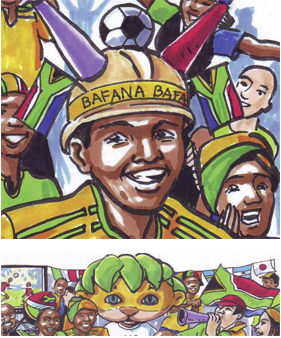 If you don't have tickets to watch World Cup matches at stadiums, you can still have loads of fun watching matches at FIFA fan parks and public viewing areas. Here you can enjoy safe and free viewing with friends and family..
If you don't have tickets to watch World Cup matches at stadiums, you can still have loads of fun watching matches at FIFA fan parks and public viewing areas. Here you can enjoy safe and free viewing with friends and family..
There will be one FIFA fan fest park in each of the host cities, except in Johannesburg, which will have two. In addition to fan parks, various host cities, as well as non-host cities and towns will also have public viewing areas. The fan parks and public viewing areas will show matches live on huge TV screens.
Both fan parks and public viewing areas will be at central points and will be safe.
Rules
Entry to fan parks and public viewing areas is free. However, there are some rules that have to be followed at official FIFA fan parks. The do's and don'ts for promotional activities during the FIFA World Cup will be clearly marked by the relevant host city.
These rules have to do with protecting the rights of the world football controlling body's partners, 2010 World Cup sponsors and national sponsors.
They include not using the FIFA logo or the names of their sponsors for personal gain, promotions etc.
FIFA warns that those found not following these rules will be informed in writing. If the situation is not corrected immediately, they may be prosecuted.
Entertainment
Between matches, entertainment will be provided in the form of live musical performances, as well as other activities for the entire family. This is to make sure that local football fans, as well as visitors, enjoy a truly African football experience. Food and drinks will also be available.
- Mbulelo Baloyi
public viewing parks:
- Cape Town's fan park is at the Grand Parade. Public viewing areas are at the Athlone Civic, Belville Velodrome, Swartklips Sports Complex and Oliver Tambo Sports Centre in Khayelitsha.
- Durban's fan park is at New Beach. Public viewing areas are in KwaMashu and at the King Zwelithini Stadium in Umlazi.
- Polokwane's fan park will be at the Polokwane Cricket Club.
- Bloemfontein/Mangaung's fan park will be at the Mangaung Outdoor Sports Centre.
- Mbombela/Nelspruit's fan park will be at the Bergvlam High School.
- The Nelson Mandela Bay Metro/Port Elizabeth fan park will be at St George's Park.
- Rustenburg's fan park will be at Field's College School.
- Johannesburg's fan parks will be at Elkah Stadium in Soweto and at Innes Free Park in Sandton. Nine public viewing areas will also be set up.
- The Tshwane/Pretoria fan park will be at the Centurion cricket ground. Public viewing areas are located in Mamelodi, Atteridgeville, Soshanguve, Hammanskraal.
2010 WORLD CUP PLATFORM FOR PEACE AND HARMONY
2010 WORLD CUP PLATFORM FOR PEACE AND HARMONY sadmin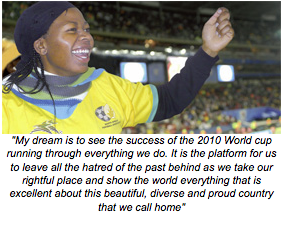 These are the words of 22-year old Christina Mashobane, a student at the University of Johannesburg. She sees the 2010 World Cup as a platform to create peace and harmony among South Africans.
These are the words of 22-year old Christina Mashobane, a student at the University of Johannesburg. She sees the 2010 World Cup as a platform to create peace and harmony among South Africans.
Open arms
Christina has been encouraging all her friends, family and anyone she meets, to learn about football and welcome football fans to our country with open arms.
"I grew up in a household that loves football. My family are huge football fans, but I didn't know much about the game before," says Christina. But when she heard that the biggest sporting event in the world was coming to South Africa, she began brushing up on her football knowledge and even started watching local football games to learn more.
At first she admits she did not know what this World Cup meant for her country, but after learning about the game, she realised that the World Cup would bring about big changes for her community, her country and the African continent.
Great moment
2010 is important to her because it will showcase our abilities as a country and what we are capable of. The world's eyes will be on us and people will no longer be ignorant about our country, she says.
"The World Cup is the biggest event since the dawn of democracy in South Africa. I want to be here to witness this great moment in history so I can tell my children and grandchildren about my experiences in years to come."
Positive attitude
"Hundreds and thousands of people will visit our country for the first time and it is up to us to give them a great and welcoming experience," says Christina.
It is the positive attitude of young South Africans like Christina who are paving the way forward for many generations to follow.
So let's join her as she celebrates our country, our heritage, our diverse culture and our people at the World Cup.
- Samona Murugan
2010 WORLD CUP READY TO SERVE AND PROTECT
2010 WORLD CUP READY TO SERVE AND PROTECT sadmin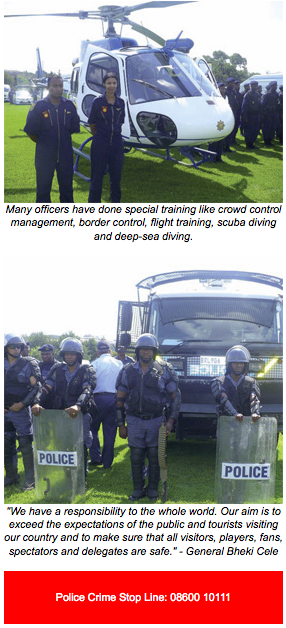 "Residents and foreign visitors can rest assured that the World Cup will be safe and secure." These are the confident and assuring words of National Police Commissioner General Bheki Cele. Cele, along with members of the Southern African Regional Police Chiefs Cooperation Organisation (SARPCCO), presented their security preparations, re-sources and manpower at a state of readiness demonstration.
"Residents and foreign visitors can rest assured that the World Cup will be safe and secure." These are the confident and assuring words of National Police Commissioner General Bheki Cele. Cele, along with members of the Southern African Regional Police Chiefs Cooperation Organisation (SARPCCO), presented their security preparations, re-sources and manpower at a state of readiness demonstration.
South Africa is ready to ensure a successful and memorable FIFA World Cup. To safeguard the World Cup, the South African Police Force (SAPF) is ready to serve and protect. The force has spent R665 million on equipment and training of officers on land, at sea and in the air.
Technology and equipment
Technology and equipment have been upgraded. These include six Robinson R44 Raven II helicopters, two Eurocopter Squirrel single-engine light utility helicopters, 10 water canons, some mobile command vehicles, 300 mobile cameras, 54 BMW patrol vehicles, body armour, diving equipment, sniper rifles, a bomb disposal robot and bomb disposal suits.
More officers
To increase officers on duty, 50 000 security personnel will be deployed. This includes 31 000 full-time police officers, 10 000 reservists and 9 000 military personnel. Of the 41 police officers on duty, more than 9 000 would be allocated to public order policing. The Metro and Traffic Police will also be on duty during the World Cup.
Special training
Many officers have done special training, like crowd control management, border control, flight training, scuba diving, deep sea diving and more. These security measures have been approved and welcomed by the police chiefs and security experts from the 31 participating countries.
A National Joint Operation Centre and Provincial Joint Operational Centres were started in May and all officers reported for duty on 24 May.
More officers
To increase security measures further, tactical response teams have been created and will be on duty at each centre. These part time special weapons and tactics-style units will deal with low to medium risk situations that are too dangerous for police officers without special training.
The National Intervention Unit and the Special Task Force (STF) will deal with the medium to high-risk situation like terrorists, cash-in-transit robberies and armed criminals. This unit is one of the top three security organisations in the world.
- Samona Murugan
2010 WORLD CUP SERVING WITH A SMILE BEYOND 2010
2010 WORLD CUP SERVING WITH A SMILE BEYOND 2010 sadmin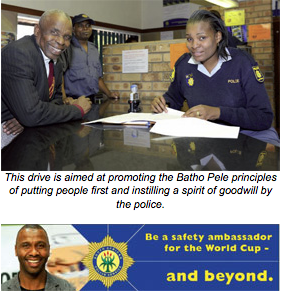 In addition to providing security for the world's greatest football tournament, police officers and civilian staff members are also prepared to be good ambassadors. They are ready to provide warm and friendly service during the 2010 FIFA World Cup and beyond.
In addition to providing security for the world's greatest football tournament, police officers and civilian staff members are also prepared to be good ambassadors. They are ready to provide warm and friendly service during the 2010 FIFA World Cup and beyond.
The Good Ambassador Campaign was launched by the South African Police Force (SAPF) in April. The message of the campaign is "Be a good ambassador for the 2010 FIFA World Cup and beyond".
Every one in every community has been called on to display a humanly attitude of welcoming guests and assisting them with whatever information from whichever sector they may need. Families of police members have also been asked to support them during this period, and to be "proud to have been part of the 2010 FIFA World Cup and the security team".
Batho pele
The goal of this drive is to promote the Batho Pele principles of putting people first. It aims to instil a spirit of goodwill by police members and all citizens of the country, before, during and after the 2010 World Cup tournament.
Raising awareness of the campaign includes advertisements on domestic airlines. There will also be posters at all police stations in the nine provinces. In addition, there will be activities linked with the Football Friday campaign.
Banners
Count-down pull-up banners have been put in police buildings with the aim of creating and keeping up excitement for the World Cup. Exhibitions at the country's airports in host cities have also been put up.
A performance featuring well-known actors has been put together for country-wide road-shows. Well-known footballers including South African Tourism 2010 World Cup Ambassador and former Bafana Bafana Captain, Lucas Radebe, are also part of the campaign. Radebe will be the Safety Ambassador for the Good Ambassador Campaign.
Defence Force
In addition to the SAPF, the South African National Defence Force will also play an active role as good ambassadors during the World Cup.
Its medical section, the South African Military Health Services, will play a supportive role to the country's medical and disaster management teams in all the host cities.
The Medical Services will ensure that visitors to South Africa experience world-class and friendly medical assistance when needed.
- Mbulelo Baloyi
2010 WORLD CUP SING WITH PRIDE & PASSION
2010 WORLD CUP SING WITH PRIDE & PASSION sadmin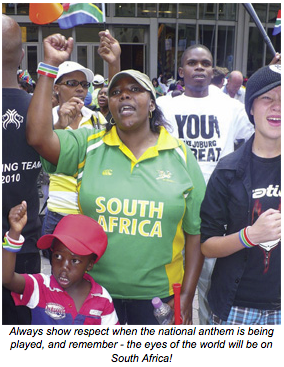 Singing our country's national anthem will be a highlight of the 2010 World Cup - so we must do it with pride and passion. But we must also show respect when other countries' anthems are played. We must be ambassadors for our country at all times.
Singing our country's national anthem will be a highlight of the 2010 World Cup - so we must do it with pride and passion. But we must also show respect when other countries' anthems are played. We must be ambassadors for our country at all times.
Our national anthem is our country's mark of honour and we should sing it with pride, passion and respect. This is why it is important to learn the words to the anthem and to behave in a respectful way when singing it.
Remember, the eyes of the world will be on South Africa during the World Cup.
Respect
There are a few rules to obey when singing the national anthem:
- Always show respect when the national anthem is being played or sung.
- Do not play any loud music while the national anthem is on.
- Stand upright and pay attention when the anthem is being played or sung.
- Do not sit down during the anthem, this is disrespectful.
- Do not talk to friends or shout on your cellphone during the anthem.
- Do not blow a vuvuzela during the national anthem.
- You may hold your right arm across your chest or in the air, or both arms at your sides while singing the national anthem.
Be polite
It is also important to be respectful of other countries' anthems, football supporters, players and officials at stadiums or any other public places.
Be polite and helpful at all times - remember you are a representative and ambassador for South Africa.
- Do not blow your vuvuzela or make any noise during the opening ceremony or when there are public announcements.
- Never behave rudely towards foreign visitors; always be friendly and show respect.
- Listen to officials at the stadium and obey the rules.
- Don't throw your litter around the stadiums or public viewing areas - use the bins provided and keep our beautiful country clean.
Be proud
Encourage your families, friends and communities to learn the national anthem and to be respectful when it is played. Be proud of your anthem and sing it with pride.
- Samona Murugan
2010 WORLD CUP UNLOCK YOUR CREATIVITY - MAKE A MAKARAPA
2010 WORLD CUP UNLOCK YOUR CREATIVITY - MAKE A MAKARAPA sadmin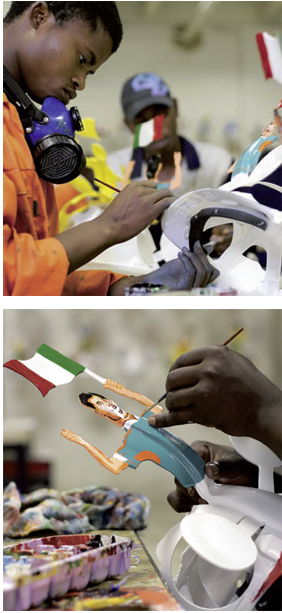 They are colourful, fun and 'fashionable'. Of all the bits and pieces surrounding soccer in South Africa, one of the most striking 'proudly South African' creations is the makarapa, worn by soccer fans to show support for their teams. You can create your own - all you need is a hard hat, paint, glue and lots of creativity.
They are colourful, fun and 'fashionable'. Of all the bits and pieces surrounding soccer in South Africa, one of the most striking 'proudly South African' creations is the makarapa, worn by soccer fans to show support for their teams. You can create your own - all you need is a hard hat, paint, glue and lots of creativity.
Makarapas have become a vital part of South African football. With thousands of football fans expected in South Africa next month for the world's biggest sporting event, loads of makarapas have been made in the national colours of the 32 participating countries.
Make your own
You can unlock your creativity and make your own makarapa!
You will need:
- a plastic miner's hat or construction site safety hat
- paint in the colour of your favourite team or the national colours of the country of your choice
- glue to stick on decorations like pictures, flags and miniature footballs
- if you want to bend, shape or cut your hat, you will need a small gas stove to heat and soften the plastic
- if you want to cut out different shapes, you will need a box cutter.
Tips
- Before painting your hat, make sure you have the right paint - some paints are not suitable for plastic and will peel off. Ask the shop assistant at your hardware or art shop to recommend paint that is suitable for plastic, for example 'quick-dry' enamel.
- Make sure you have the right kind of glue that will stick on plastic. You can ask advice at your hardware shop.
- If you decide to heat your hat, be careful not to overheat it as the plastic can easily melt, which will ruin your hat.
- Before cutting out anything, make sure exactly where you want to cut so that you don't cut away too much.
Decoration
After you have shaped and painted your hat, it is ready to be decorated with different images or football-related items.
These can include cut-out pictures of your favourite football players, small footballs, vuvuzelas, bicycle bells, giant false spectacles, slogans, flags or the names of your favourite teams. You can also add small horns of goats or buck.
Use your imagination for more ideas, get the whole family to join in and have some creative fun.
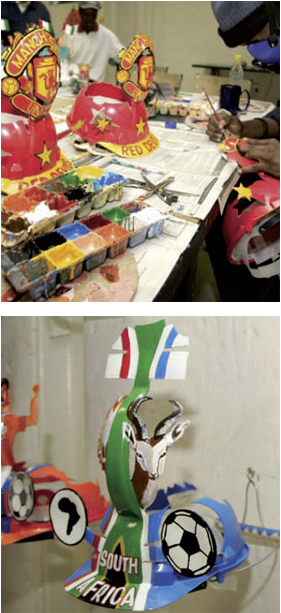
- Mbulelo Baloyi
2010 WORLD CUP WELCOMING THE WORLD IN STYLE
2010 WORLD CUP WELCOMING THE WORLD IN STYLE sadmin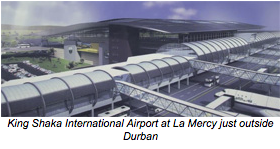 Durban is ready to welcome football players, fans, supporters and visitors to the World Cup in style at its brand new, modern King Shaka International Airport. The new airport replaces Durban's old international airport, which has become too small to handle the increasing number of visitors to the city.
Durban is ready to welcome football players, fans, supporters and visitors to the World Cup in style at its brand new, modern King Shaka International Airport. The new airport replaces Durban's old international airport, which has become too small to handle the increasing number of visitors to the city.
King Shaka International Airport is situated at La Mercy some 35 kilometres north of Durban's city centre.
The Airports Company of South Africa (ACSA) opened the doors to the airport on 1 May. It has been built with the latest technology to make it a world-class experience for visitors. A lot of hard work, training and dedication has gone into making the change-over from the old airport as smooth as possible.
Longer runway
The land to build a new airport was bought forty years ago, but construction only started in August 2007. Three years later, the airport boasts a 200-hectare terminal platform and a 3,7 kilometre runway.
The new extended length of the runway will make it possible for more international flights and larger aircrafts to land in Durban. A second runway is planned to handle growing traffic.
Plans are also in place to ensure that the airport will be able to handle rising numbers of passengers. Numbers are expected to grow from 7,5 million in 2010 to well over 45 million in the future.
Job creation
Hundreds of jobs have been created in the construction and transition of the airport.
In addition, together with Dube Trade Port, the airport forms a regional development node. This includes the 36-hectare Trade Zone, which will accommodate a cargo terminal, a perishables centre, warehousing and light manufacturing facilities. The cargo terminal is fully mechanised and automated, the first of its kind in South Africa and only the second in Africa.
Built with pride
The new world-class airport has been built with pride to ensure that our visitors and all other airport users leave with positive memories of an enjoyable experience.
The following airlines have been allocated ticket sale counters opposite their check-in counters: Air Mauritius, British Airways Comair, Kulula, Mango, 1 Time, SA Airlink, South African Airways and Emirates.
- Samona Murugan
Most people have access to a cellphone and this means you are holding the Internet in your hands. Government understands this. Mobile phones will be important to access information during the World Cup. If you need to be kept informed and up-to- date, here are some of the more important World Cup sites that you can log onto: SA2010.gov.za; Fifa.com; Southafrica.net; Southafrica.info; findyourway2010.co.za. Go ahead and try them
2010 WORLD CUP WHEN AND WHERE?
2010 WORLD CUP WHEN AND WHERE? sadmin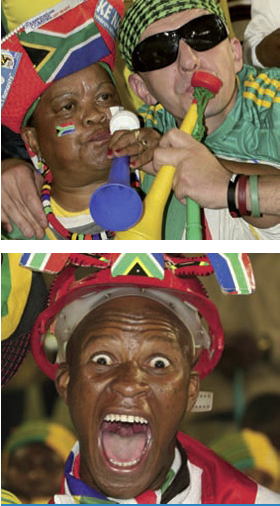 Millions of football fans from all over the world will soon unite under the African sky to witness football at its best. They will be watching the games played at our beautiful soccer stadiums. Below are the fixtures.
Millions of football fans from all over the world will soon unite under the African sky to witness football at its best. They will be watching the games played at our beautiful soccer stadiums. Below are the fixtures.
Soccer City, Johannesburg
| DATE | MATCH | TIME |
| June 11 | Match 1, South Africa vs Mexico | 16:00 |
| June 14 | Match 9, Netherlands vs Denmark | 13:30 |
| June 17 | Match 20, Argentina vs Korea Republic | 13:30 |
| June 20 | Match 29, Brazil vs Ivory Coast | 20:30 |
| June 23 | Match 39, Ghana vs Germany | 20:30 |
| June 27 |
Match 52, last 16, the winning team in Group B vs the runner-up team in Group A |
20:30 |
| July 2 | Match 58, QUARTER FINAL | 20:30 |
| July 11 | Match 64 FINAL | 20:30 |
Loftus Versfeld Stadium, Pretoria
| DATE | MATCH | TIME |
| June 13 | Match 8, Serbia vs Ghana | 16:00 |
| June 16 | Match 17, South Africa vs Uruguay | 20:30 |
| June 19 | Match 26, Cameroon vs Denmark | 20:30 |
| June 23 | Match 38, USA vs Algeria | 16:00 |
| June 25 | Match 47, Chile vs Spain | 20:30 |
| June 29 |
Match 55, last 16, the winning team in Group F vs the runner-up team in Group E |
16:00 |
Moses Mabhida Stadium, Durban
| DATE | MATCH | TIME |
| June 13 | Match 7, Germany vs Australia | 20:30 |
| June 16 | Match 16, Spain vs Switzerland | 16:00 |
| June 19 | Match 25, Netherlands vs Japan | 13:30 |
| June 22 | Match 35, Nigeria vs Korea Republic | 20:30 |
| June 25 | Match 45, Portugal vs Brazil | 16:00 |
| June 28 |
Match 53, last 16, the winning team in Group E vs the runner-up team in Group F |
16:00 |
| July 7 | Match 62, SEMI-FINAL | 20:30 |
Greenpoint Stadium, Cape Town
| DATE | MATCH | TIME |
| June 11 | Match 2, Uruguay vs France | 20:30 |
| June 14 | Match 11, Italy vs Paraguay | 20:30 |
| June 18 | Match 23, England vs Algeria | 20:30 |
| June 21 | Match 30, Portugal vs Korea DPR | 13:30 |
| June 24 | Match 44, Cameroon vs Netherlands | 20:30 |
| June 29 |
Match 56, last 16, the winning team from Group H vs the runner-up team in Group G |
20:30 |
| July 3 | Match 59, QUARTER FINAL | 16:00 |
| July 6 | Match 63, SEMI FINAL | 20:30 |
Ellis Park, Johannesburg
| DATE | MATCH | TIME |
| June 12 | Match 3, Argentina vs Nigeria | 16:00 |
| June 15 | Match 14, Brazil vs Korea DPR | 20:30 |
| June 18 | Match 22, Slovenia vs USA | 16:00 |
| June 21 | Match 32, Spain vs Honduras | 20:30 |
| June 24 | Match 41, Slovakia vs Italy | 16:00 |
| June 28 |
Match 54, Last 16, the winning team in Group G vs the runner-up team in Group H |
20:30 |
| July 3 | Match 60, QUARTER FINAL | 20:30 |
Vodacom Park Free State Stadium, Bloemfontein
| DATE | MATCH | TIME |
| June 14 | Match 10, Japan vs Cameroon | 16:00 |
| June 17 | Match 19, Greece vs Nigeria | 16:00 |
| June 20 | Match 27, Slovakia vs Paraguay | 13:30 |
| June 22 | Match 34, France vs South Africa | 16:00 |
| June 25 | Match 48, Switzerland vs Honduras | 20:30 |
| June 27 |
Match 51, last 16, winning team from Group D vs the runner-up team from Group C |
16:00 |
Mbombela Stadium, Nelspruit
| DATE | MATCH | TIME |
| June 16 | Match 15, Honduras vs Chile | 13:30 |
| June 20 | Match 28, Italy vs New Zealand | 16:00 |
| June 23 | Match 28, Italy vs New Zealand | 20:30 |
| June 25 | Match 46, Korea Republic vs Ivory Coasta | 16:00 |
Royal Bafokeng Stadium, Rustenburg
| DATE | MATCH | TIME |
| June 12 | Match 5, England vs USA | 20:30 |
| June 15 | Match 12, New Zealand vs Slovakia | 13:30 |
| June 19 | Match 24, Ghana vs Australia | 16:00 |
| June 22 | Match 33, Mexico vs Uruguay | 16:00 |
| June 24 | Match 23, Denmark vs Japan | 20:30 |
| June 26 |
Match 50, last 16, winning team in Group C vs runner-up team in Group D |
20:30 |
Peter Mokaba Stadium, Polokwane
| DATE | MATCH | TIME |
| June 13 | Match 6, Algeria vs Slovenia | 13:30 |
| June 17 | Match 18, France vs Mexico | 20:30 |
| June 22 | Match 36, Greece vs Argentina | 20:30 |
| June 24 | Match 42, Paraguay vs New Zealand | 16:00 |
Nelson Mandela Stadium, Port Elizabeth
| DATE | MATCH | TIME |
| June 12 | Match 4, Korea Republic vs Greece | 13:30 |
| June 15 | Match 13, Ivory Coast vs Portugal | 16:00 |
| June 18 | Match 21, Germany vs Serbia | 13:30 |
| June 21 | Match 31, Chile vs Switzerland | 16:00 |
| June 23 | Match 37, Slovenia vs England | 16:00 |
| June 26 |
Match 49, last 16, winning team from Group A vs the runner-up team from Group B |
16:00 |
| July 2 | Match 57, QUARTER FINAL | 16:00 |
| July 10 | Match 63, play-off for 3rd place | 20:30 |
Group A: South Africa, Mexico, Uruguay and France,
Group B: Argentina, Nigeria, Korea Republic and Greece
Group C: England, USA, Algeria and Slovenia,
Group D: Germany, Australia, Serbia and Ghana,
Group E: the Netherlands, Denmark, Japan and Cameroon,
Group F: Italy, Paraguay, New Zealand and Slovakia,
Group G: Brazil, Korea DPR, Ivory Coast and Portugal
Group H: Spain, Switzerland, Honduras and Chile
ADVERTORIAL - DTI RULES FOR USING FIFA MARKS
ADVERTORIAL - DTI RULES FOR USING FIFA MARKS sadmin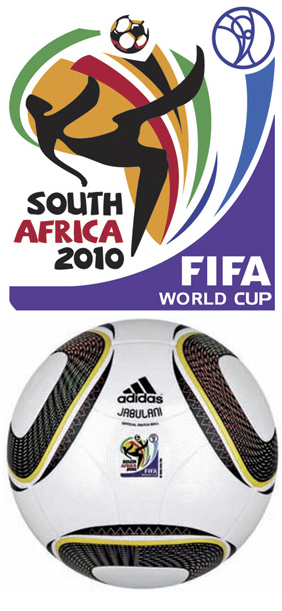 A law called the Merchandise Marks Act empowers the Minister of Trade and Industry (the dti) to prohibit the use of words, marks, logos, etc, in certain aspects of business trade. An example of this is the FIFA logo and words related to the 2010 World Cup.
A law called the Merchandise Marks Act empowers the Minister of Trade and Industry (the dti) to prohibit the use of words, marks, logos, etc, in certain aspects of business trade. An example of this is the FIFA logo and words related to the 2010 World Cup.
In line with the law, the FIFA World Cup has been designated as a "protected event" and certain logos and marks belonging to FIFA may not be used without permission. This protects them from being used by people or businesses for personal gain.
Conditions for protecting an event
For an event to enjoy a "protected event" status, certain conditions must be met:
- the sport event must be in the public interests, e.g. tourists visiting the country and South Africans enjoying the games and social aspects
- organisers of the sporting event must ensure that they create business opportunities for small businesses coming from previously disadvantaged communities. In this regard, the Minister demanded that 30 per cent of FIFA budget must benefit small businesses.
If the above conditions are not met, the Minister can withdraw the protection granted to FIFA through the prohibition notice.
Trading related to the FIFA World Cup
Business opportunities that are related to FIFA, but not managed by FIFA come from public viewing areas, which do not fall under FIFA. Public viewing areas are places like sports grounds and parks managed by district municipalities.
These places do not fall under FIFA's laws, but have to comply with the municipal laws, and health and safety issues of the particular municipality under which they fall. Non-sponsors of FIFA are free to sell their products, as long as they are licensed by the municipalities and do not use FIFA logos unlawfully.
Sponsors
There will be about 10 FIFA Fan Parks and nobody is allowed to sell products in these parks other than FIFA sponsors. The sponsors are, among others, Budweiser (beer), McDonalds, Hyundai (cars), MTN (mobile phones), Emirates (airliner), Coca Cola (beverage), Telkom (landline telephones), FNB (banking). Competitors of these sponsors are prohibited from selling goods or participate in fan parks and FIFA-related matters.
Members of the public can request licenses from FIFA or Sponsors to sell their merchandise in Fan Parks and everywhere in South Africa. These products should, for example bear logos of FIFA sponsors or FIFA t-shirts.
For more information contact: Mr MacDonald Netshitenzhe, Consumer and Corporate Regulation Division, Tel: (012) 394 1510 E-mail: MNetshitenzhe@thedti.gov.za Websites: www.thedti.gov.za, or www.sa2010.gov.za
AFFORDABLE HOUSING FOR ALL
AFFORDABLE HOUSING FOR ALL sadmin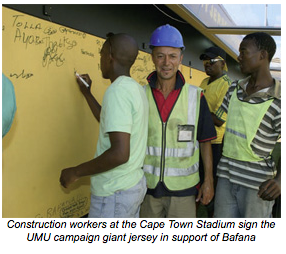 The national football team jersey manufacturer and sponsor, Adidas, together with the 2010 Local Organising Committee, is calling on all South Africans to support the national soccer team. The Adidas Unite Mzansi Unite (UMU) campaign is aimed at uniting South Africans behind the 2010 FIFA World Cup. The tour has given the entire nation, from school children to celebrities, the opportunity to sign the giant jersey as a demonstration of their support. By signing the jersey, you will become part of history.
The national football team jersey manufacturer and sponsor, Adidas, together with the 2010 Local Organising Committee, is calling on all South Africans to support the national soccer team. The Adidas Unite Mzansi Unite (UMU) campaign is aimed at uniting South Africans behind the 2010 FIFA World Cup. The tour has given the entire nation, from school children to celebrities, the opportunity to sign the giant jersey as a demonstration of their support. By signing the jersey, you will become part of history.
The giant jersey has been on a tour of South Africa using a huge branded truck. The campaign started in November last year and finishes in June this year - the eve of the start of the 2010 World Cup.
- Mbulelo Baloyi
CARING FOR THE ENVIRONMENT SAVING THE PLANET, ONE TREE AT A TIME
CARING FOR THE ENVIRONMENT SAVING THE PLANET, ONE TREE AT A TIME sadmin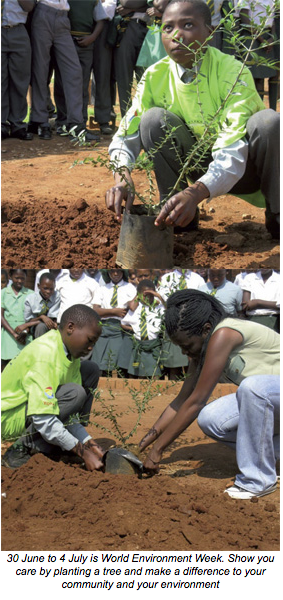 Tribute Mboweni is only 23 years old, but she is already making a big difference in her community and at schools. Since completing her studies in Eco-Tourism, Mboweni felt a need to teach people about caring for the environment by planting trees.
Tribute Mboweni is only 23 years old, but she is already making a big difference in her community and at schools. Since completing her studies in Eco-Tourism, Mboweni felt a need to teach people about caring for the environment by planting trees.
"People in my community did not understand what they could do to save and conserve our environment, and not many of them understood what eco-tourism was all about," Mboweni said. She decided that she wanted to change this.
Planting trees
Mboweni, who studied at the Tshwane University of Technology, started her project, called Project 23 - the Green Movement, to teach young school children the importance of environmental conservation. The project teaches children about caring for the environment by planting trees.
With help from the Department of Agriculture, Forestry and Fisheries and the Department of Water Affairs, Project 23 is now registered as a non-governmental organisation (NGO).
Making a difference
The project is very successful and is already making a difference in many communities across the country. It encourages schools and families to plant trees and to use eco friendly products that do not harm the earth.
Mboweni entered the project in the Bayer Young Environmental Envoys competition and won.
For her hard work and achievements in her community, Mboweni has been chosen as an Environmental Youth Minister and will represent South Africa at the Environmental Youth Summit in Canada in May.
The summit is an opportunity for many young leaders from different countries, like Mboweni, to meet and talk about environmental issues.
How you can be more environment-friendly:
- plant more trees
- use fabric or paper shopping bags instead of buying plastic ones - plastic harms the environment because it doesn't decompose (break down)
- recycle and re-use paper, glass and plastic
- don't litter; throw your rubbish in bins - littering harms the environment
- save energy and water n don't use harmful detergents for cleaning - use eco-friendly products.
- Samona Murugan
- filter pollution from the air
- help recycle water
- prevent soil loss
- give shade and shelter from wind and rain
- provide homes for animals
- produce food for people and animals
- provide wood for furniture and building
- beautify the environment
Tribute Mboweni: 076 471 1278
Department of Agriculture, Fisheries and Forestry: 012 319-6000
Department of Water Affairs: 012 336-7500
CARTOON STRIP EPISODE 5: IMBIZO JUNCTION LET'S FIGHT CRIME TOGETHER!
CARTOON STRIP EPISODE 5: IMBIZO JUNCTION LET'S FIGHT CRIME TOGETHER! sadmin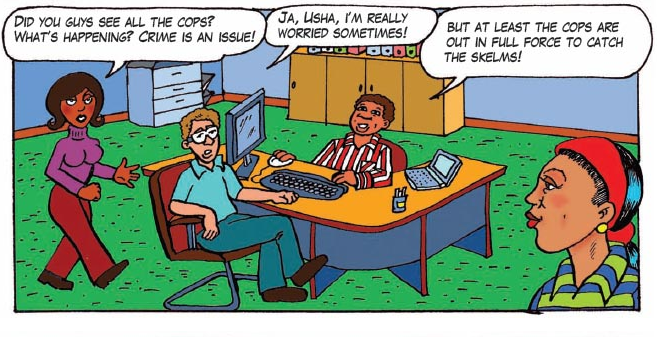
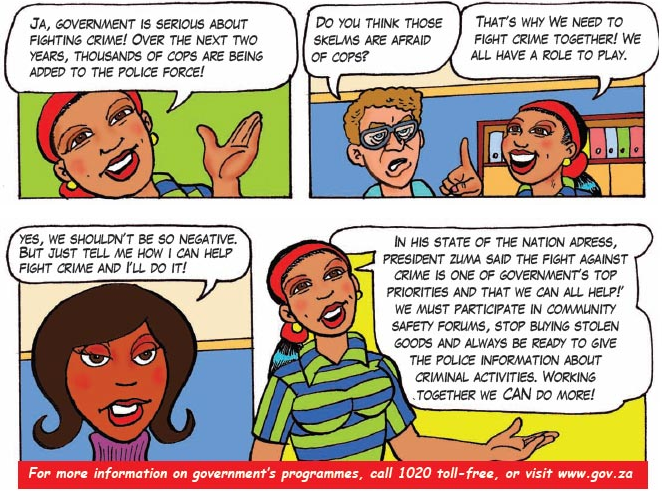
FUN PAGE WORLD CUP
FUN PAGE WORLD CUP sadminPLEASE NOTE:
The games on this page are not competitions. They are only for fun, so don't send your answers to Vuk'uzenzele.
Do you now your host CITIES?
The soccer balls on this map of South Africa are placed where the 2010 World Cup host cities are situated. The nine host cities are listed below, but the names are scrambled. See if you can unscramble the names and match them with the numbers. You can use an atlas to help you. If you don't have your own atlas, ask your teacher or library. Turn the page upside down for the answers.
Print the image below to complete this game...
a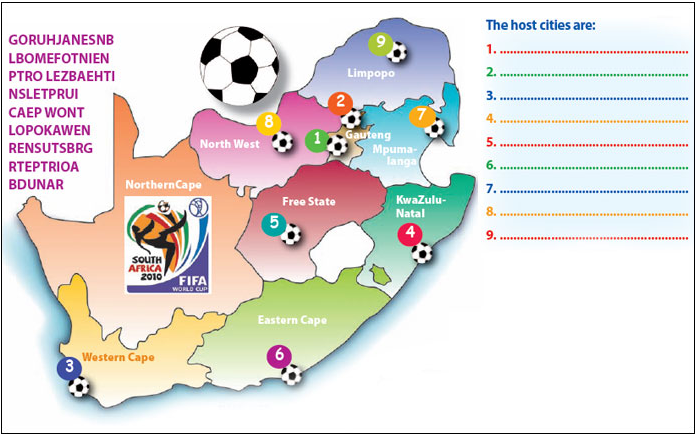
Fill in the Missing Words
Complete the sentences by filling in the missing words.
Print the image below to complete this game...
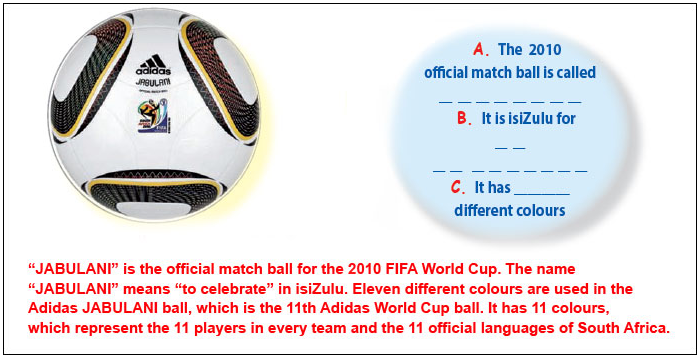
Find the names of the African Teams
Six African teams are participating in the World Cup. They are Algeria, Cameroon, Ghana, Ivory Coast, Nigeria and South Africa. Find the names in the grid and circle them, like the word "ball". They can go diagonally, up, down, forward, backward.
Print the image below to complete this game...
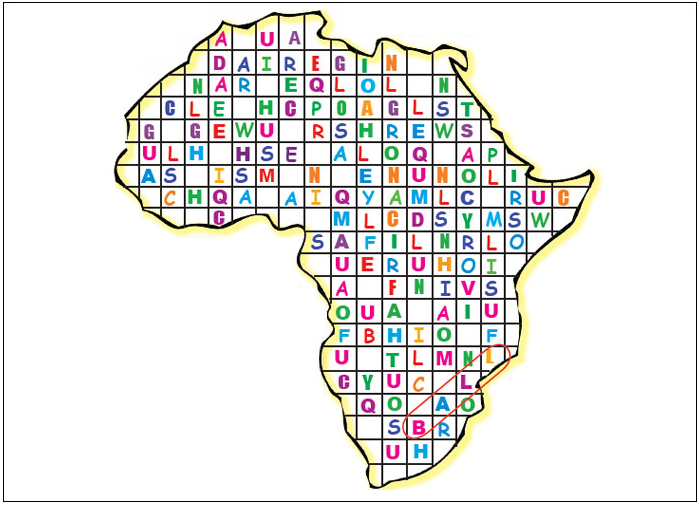
HEALTH VACCINATE YOUR CHILD!
HEALTH VACCINATE YOUR CHILD! sadmin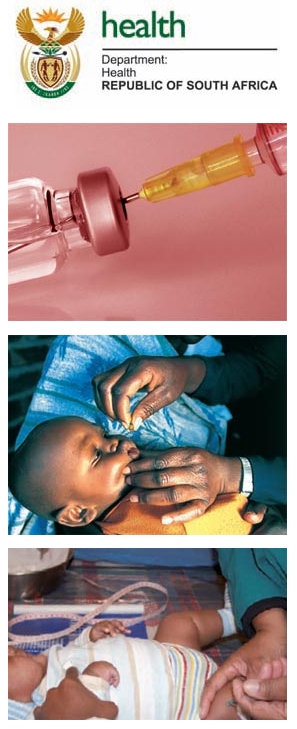 Vaccines are one of the most important ways to help prevent infectious diseases. In the past, before there were vaccines, many children died or had severe complications following infections.
Vaccines are one of the most important ways to help prevent infectious diseases. In the past, before there were vaccines, many children died or had severe complications following infections.
Parents and care-givers of children are urged to ensure that their children receive all their vaccines at the right age. This can be done by checking your child's Road to Health/Immunisation card. If you are not sure, you can check at your local clinic.
What is polio?
Polio is a highly infectious disease caused by a virus. It invades the nervous system, and can cause a person to become totally paralysed within hours. Initial symptoms are fever, tiredness, headache, vomiting, stiffness in the neck and pain in the limbs. Polio mainly affects children under five years old. There is no cure for polio but it can be prevented by the polio vaccine, given multiple times. This can protect a child for life.
What is pneumonia?
Pneumonia is a form of acute infection in the lungs. When a person has pneumonia, the small lung sacs called alveoli are filled with pus and fluid, which makes it difficult to breathe. Pneumonia is the single largest cause of death in children worldwide.
What is tetanus?
Tetanus, commonly called 'lockjaw', affects the nervous system. People can get it through a cut or wound that becomes infected with tetanus bacteria (germs), mostly found in soil, dust or manure. It can get in through even a tiny hole or scratch, but deep wounds or cuts are more easily infected. It causes severe muscle spasms, leading to 'locking' of the jaw so the patient cannot open his or her mouth or swallow. It may lead to death by suffocation.
What is tuberculosis?
Tuberculosis (TB) is a contagious disease. Like the common cold, it spreads through the air. Only people who are sick with TB in their lungs are infectious. When infected people cough, sneeze, talk or spit, they send TB germs, known as bacilli, into the air. A person needs only to inhale a small number of these to be infected.
What is measles?
Measles is a highly infectious disease caused by a virus. Signs of measles are high fever, fine red rash and cold-like symptoms - cough, runny nose and watery red eyes. Measles can cause complications like pneumonia, deafness and death. Measles is one of the leading causes of death among young children globally, despite the availability of a vaccine.
What is diphtheria?
Diphtheria is an infectious disease spread from person to person by droplets from the throat through coughing and sneezing. Diphtheria usually affects the tonsils, throat, voice box and sometimes the skin. Symptoms include sore throat, fever, neck swelling, difficulty swallowing and breathing and weakness. People can die from the disease.
What is mumps?
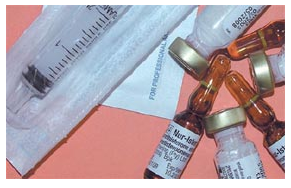 Mumps is an infection caused by a virus and is mostly a mild childhood disease. The mumps virus usually affects children between five and nine years old, but it can infect adults as well. It is spread by droplets released in the air when an infected person sneezes or coughs and by direct contact with an infected person.
Mumps is an infection caused by a virus and is mostly a mild childhood disease. The mumps virus usually affects children between five and nine years old, but it can infect adults as well. It is spread by droplets released in the air when an infected person sneezes or coughs and by direct contact with an infected person.
What is rubella (German measles)?
Rubella is an infection caused by a virus. It is spread through the air when infected people sneeze or cough. Congenital rubella syndrome (CRS) is an important cause of severe birth defects. When a woman is infected with the rubella virus early in pregnancy, she has a 90 per cent chance of passing the virus on to her unborn baby. This can cause the death of the unborn baby. Even though it is a mild childhood disease, CRS causes birth defects like deafness. It can also cause defects in the eyes, heart, and brain.
What is hepatitis B?
Hepatitis B is a potentially life-threatening liver infection caused by the hepatitis B virus. It is a major global health problem and the most serious type of viral hepatitis. It can cause chronic liver disease and puts people at high risk of death from cirrhosis of the liver and liver cancer.
What is whooping cough (pertussis)?
Whooping cough - or pertussis - is an infection of the respiratory (breathing) system. It causes severe coughing spells that end in a "whooping" sound when the person breathes in. It is very contagious. The germs are spread from person to person through tiny drops of fluid from an infected person's nose or mouth when the person sneezes, coughs, or laughs. Other people can become infected by breathing in the drops or getting the drops on their hands and then touching their mouths or noses.
| DISEASE | VACCINATION | AGE |
| Polio | TOPV | Oral drops at birth and repeated at six, 10 and 14 weeks, 18 months and five years |
| Tuberculosis | BCG (bacillus Calmette-Guérin vaccine) | Birth |
| Diphtheria | DPT (diphtheria, tetanus, pertussis [whooping cough] vaccine) | Six weeks and repeated at 10 and 14 weeks, 18 months and five years |
| Whooping cough or pertussis | DTP (diphtheria, tetanus, pertussis [whooping cough] vaccine) | Six weeks and repeated at 10 and 14 weeks, and 18 months |
| Tetanus | DTP (diphtheria, tetanus, pertussis [whooping cough] vaccine) | Six weeks and repeated at 10 and 14 weeks, 18 months and five years |
| Hepatitis B | HBV (hepatitis B vaccine) | Six weeks and repeated at 10 and 14 weeks |
| Meningitis/severe pneumonia | Hib (haemophilus influenza group b [meningitis] vaccine) | Six weeks and repeated at 10 and 14 weeks |
| Measles | Measles vaccine | Nine months and repeated at 18 months and in combination with MMR at 15 months |
| Mumps | MMR (mumps, measles and rubella [German measles]) vaccine | 15 months |
| Rubella (German measles) | MMR (mumps, measles and rubella [German measles]) vaccine | 15 months |
For more information, visit the Department of Health's website: www.doh.gov.za, or call 012 312-3174
HOST CITIES READY TO WELCOME THE WORLD...
HOST CITIES READY TO WELCOME THE WORLD... sadminCAPE TOWN
The terminal at the Mother City's International Airport has undergone a complete transformation, making it bigger and ready to receive thousands of football fans. The city offers an abundance of attractions. Apart from Table Mountain, it has beautiful beaches and breathtaking scenery, historical buildings, museums, art galleries, street markets, world-class restaurants, wine estates and theatres.
JOHANNESBURG
Johannesburg is known as the City of Gold and the business hub of South Africa. It will also be the hub of World Cup activities as both the opening and final games will be played at Soccer City. With loads of clubs, restaurants, theatres, markets and shopping malls, the city is ready to entertain visitors. Interesting places to visit include the Apartheid Museum, Constitution Hill and Gold Reef City.
PRETORIA
The greater municipal area of the country's capital city is called Tshwane. Its Loftus Versfeld Stadium, one of the oldest stadiums in South Africa, has been used for both rugby and football matches and is home to one of the country's top rugby teams, the Blue Bulls. It has been upgraded for 2010 and seats almost 50 000. The city's rich and colourful heritage includes the famous Union Buildings.
DURBAN
The city and its greater municipal area called Ethekwini, is ready for the 2010 World Cup and beyond. It has a stunning new stadium, a revamped public transport system and the modern new King Shaka International Airport, which opened in May. Its Fan Park is situated on the beach-front close to the Kings Park sports complex, transport facilities and other entertainment. Its beautiful beaches and rich culture are world famous.
BLOEMFONTEIN
Bloemfontein is South Africa's judicial capital. Its greater municipality was recently renamed Mangaung, which means "place of the cheetahs" in Sesotho. Its Free State Stadium will host six World Cup matches. The city, also known as "the city of roses", owing to the abundance of roses, is the most centrally located city in South Africa, accessible by car from anywhere in the country within 12 hours.
NELSPRUIT
Nelspruit, the capital city of Mpumalanga, boasts a beautiful new football stadium, specially built for 2010. With its unique zebra patterned seats and giraffe-themed roof supports, Mbombela Stadium is a truly African World Cup stadium. Nelspruit is close to some of South Africa's most breathtaking scenery and popular game reserves, including the famous Kruger National Park.
POLOKWANE
This truly African city with its newly built 2010 football stadium, is a great place for visitors to start their African journey. Its international airport serves as a gateway to the continent, it offers a wealth of wildlife, culture and heritage, beautiful rugged landscapes and friendly people who are happy to talk about African football! It is also close to one of the major attractions in Limpopo, the Mapungubwe National Park.
PORT ELIZABETH
Located in the Eastern Cape Province, the 'Friendly City' will host the third and fourth place playoffs of the World Cup. The greater municipal area has recently been renamed Nelson Mandela Bay and has been home to some of the country's most iconic figures. They include Nelson Mandela, Thabo Mbeki, Steve Biko, Chris Hani, Walter Sisulu and Oliver Tambo, as well as other heroes of the freedom struggle.
RUSTENBURG
The city's newly revamped Royal Bafokeng stadium is ready to accommodate 44 385 football fans. Situated at the foot of the Magalies mountain range in the North West province, Rustenburg is close to several game lodges and nature reserves. It is also home to the largest platinum mines in the world and the largest platinum refinery, which processes about 70 per cent of the world's platinum.
LETTERS TO THE EDITOR GIVE US A PIECE OF YOUR MIND
LETTERS TO THE EDITOR GIVE US A PIECE OF YOUR MIND sadmin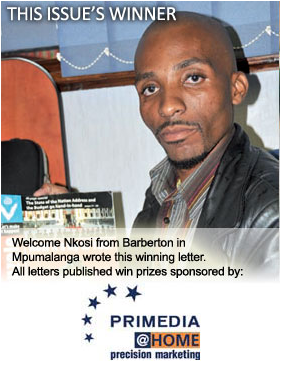 WINNING LETTER
WINNING LETTER
Unite behind Bafana and let them shine
As a winning nation, let us today stand, rally and unite wholeheartedly behind Bafana for the 2010 FIFA World Cup spectacular - the first to be staged on African turf. Our founding fathers were conquerors and we are too! The fact that we won the hosting rights under adverse conditions and against all odds, means we can also win it for the beautiful continent of Africa. Let us have confidence in our boys, coach Parreira and his dedicated technical team. Given our support, they will shine, for nothing is impossible. History has proven that host nations often do well because of player number 12. Let us cheer Bafana and the other participating African teams all the way. In a nutshell, let us be inspired by the African dream of success and glory!
- Welcome Nkosi, Barberton, Mpumalanga
Letters
Thumbs up, South Africa
Only a few days are left before the World Cup. It's time we embrace the countries of the world who are getting ready to set foot on our shores. Let every South African be ready to show the spirit of ubuntu to our visitors! Yes, we can! We can host the World Cup. We are part of the global community. Let us prosper together. Let us unite and not entertain negativity. Our economy, politics and tourism will be boosted. Thumbs up South Africa, the dream has come true.
- Siyabonga Twaku, Queenstown, Eastern Cape
Let's shake the world with soccer
Every Friday we have a campaign called Football Friday when each South African can wear a football jersey with the purpose of reminding us that soon South Africa is going to shake the world with soccer.
I'm calling on all South Africans to wear their green and gold beautiful Bafana jerseys to show the world that they are proudly South African and to convince those who have been saying that we are unfit to be the host that they are wrong. Let's stop wearing the jerseys of European teams such as Chelsea and Liverpool and wear our own team's jersey. As proudly South African, let us do the right thing.
- Tshediso Richard Koloti, Botshabelo, Free State
We are feeling safer
I would like to congratulate the Crime Prevention Forum of Emalahleni Municipality for creating a programme of street committees. I also give thanks to the people of the community who volunteer to help prevent crime in our community, because now we are feeling much safer. At night there is no noise and we sleep well without fear.
- Nokuthula Pika, Indwe, Eastern Cape
Be alert and save a life
Suicide is a very scary situation that we are often faced with. Many people believe killing themselves is the only solution to their problems. This is certainly not the case.
Most often people who are in this frame of mind reach out for help, but we unintentionally or unknowingly ignore their plea. We need to be alert and realise when someone needs our help. This could help save a life.
- Brian Ramahlo, Namakgale
Destructive words hurt
Many young people doubt their abilities to succeed in what they do. Family members often play a major role in shaping their lives. Parents sometimes use destructive words when talking to their children, for example "you will amount to nothing". Such words may lead the child to believe that he will never achieve success.
Comments that fail to build young people, lead them on a bleak path on which they trudge without looking forward to positive developments in their lives.
- Mphulanyane Simon, Botshabelo, Free State
Have a giving heart
Some people think giving help to the Haitians was a waste of money. Here in South Africa we have people who are suffering, like homeless street kids, so why do we pass them by and help the Haitians with food and shelter. But we have international relationships and there is a difference between poverty and disasters. Maybe in future we will need help from other countries, so let us have a good heart of giving - by giving your hand is blessed.
- James Jabuza, Kwamhlanga, Gauteng
Littering is senseless
Wherever we go we should throw our rubbish in a dustbin. If there's no dustbin, keep it with you until you find a dustbin to throw it away, even at your home. It is understandable if the wind or storms blow rubbish around, but if we just throw things anywhere it doesn't make sense. So, let's learn not to litter and to be passionate about a clean environment.
- Qinisela Zuma, Weenen, KwaZulu-Natal
Thank you Vuk'uzenzele
I grew up with kids who were into drugs and alcohol. Living with only a single mother and a little sister. We had financial problems so I thought maybe if I became a sex worker it would make a difference. Then my mother got sick and it was my responsibility to take care of my little sister. One day reading Vuk'uzenzele, there was a letter which changed my life - it said "don't blame poverty". Since then I've changed. I'm selling sweets and chips and I'm doing my first year in journalism and freelancing at a local newspaper to gain experience. Thank you Vuk'uzenzele.
- Sizwe Ndaba, Mthatha, Eastern Cape
Don't believe in failure
Some of us seem to think how we were brought into this world should define the rest of our lives. Yes, you did not choose how you came to this world, but you can decide how you want to live your life. Most people wrongfully believe that some of us are born to be failures, while others are born to be successful. Failures are those who choose to give up. So it's up to you to turn your dreams around. Being born in a poverty-stricken house is never a guarantee that you will end up the same.
- Matome Kubu, Arcadia, Tshwane
WRITE TO:
Vuk'uzenzele, Private Bag X745, Pretoria, 0001, or e-mail: vukuzenzele@gcis.gov.za.
If you don't want to have your real name published, you may use a different name, but you must include your real name and address to us.
PLEASE NOTE:
To win a prize, you must include a physical address and a contact telephone number in letters to us.
All letters will get a response.
MANAGING YOUR MONEY BE ALERT WHEN SHOPPING
MANAGING YOUR MONEY BE ALERT WHEN SHOPPING sadmin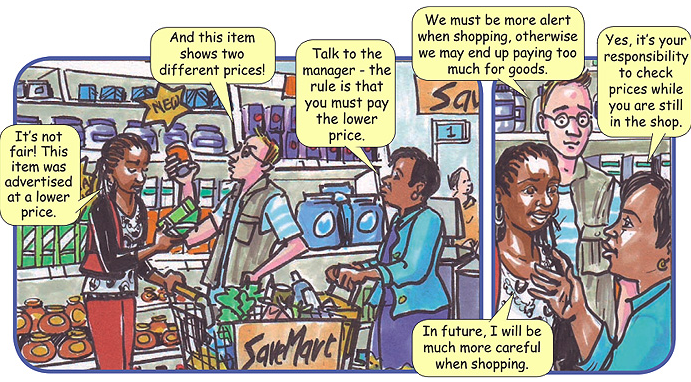
Every day, thousands of people buy goods at supermarkets or other stores. Without realising it, shoppers often end up paying the wrong price for items. This is because they are not watchful about pricing while shopping.
Do you pay attention to the prices displayed on supermarket shelves? If you do, you will notice that sometimes the prices on the items don't match the prices at the till or those advertised in the media.
Shoppers normally do not notice the price differences and often pay too much for an item without realising it. It is important to be alert when choosing and paying for your groceries.
What can affect the prices?
Shops would normally not deliberately mislead their customers. It is very easy for a mistake to occur and there are different factors that play a role in pricing.
For example, errors often occur during weekends when supermarkets change their prices or offer specials. It also happens with fresh 2010products like vegetables, which have to be kept cool. Frozen items covered in ice are sometimes too cold to scan and the cashier has to enter the number by hand. The cashier may also have trouble reading the numbers when the code is written by hand.
Cashiers can also accidentally ring up items of the person standing in line behind you or an item can accidentally be entered twice. In addition, when a shop has new equipment, it can read a bar code on an item incorrectly.
What you can do
According to the South African National Consumer Union (SANCU), mistakes do happen and it is the consumers' responsibility to check the prices while they are still in the shop.
If you notice that certain prices differ, do not panic or be rude to cashiers - they often work long hours and anyone can make a mistake. Just tell the cashier about the price difference and ask him or her to correct the price. If the cashier cannot help you, speak to the manager, supervisor or a consumer advisor.
Insist on the lower price
The Consumer Protection Act says that if more than one price is displayed, the lower price applies. So, you must insist on paying the lower price as advertised because it is your right to do so.
Before you leave the store make sure that all the items you have paid for have been put in your shopping bag. Small items can sometimes be covered by shopping bags at the till.
- Samona Murugan
MEETING THE ENERGY DEMAND SOLAR ENERGY TO THE RESCUE
MEETING THE ENERGY DEMAND SOLAR ENERGY TO THE RESCUE sadmin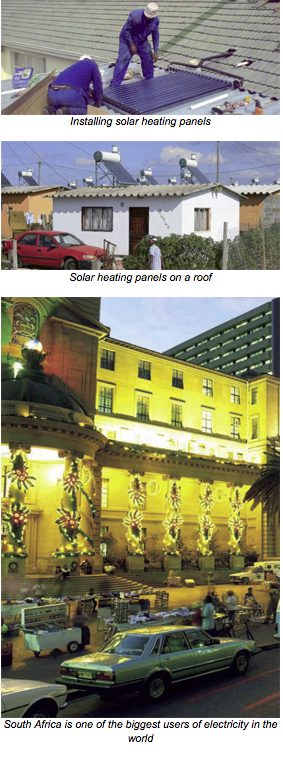 South Africa has become one of the biggest electricity users in the world. More and more households are using electric heaters, stoves, kettles, geysers and other electric appliances. As a result, the country has experienced power cuts because the high demand could not be met.
South Africa has become one of the biggest electricity users in the world. More and more households are using electric heaters, stoves, kettles, geysers and other electric appliances. As a result, the country has experienced power cuts because the high demand could not be met.
Most methods of heating water like electric kettles, stoves, or geysers use a lot of electricity. To help reduce our country's electricity usage, government has launched a programme called the National Solar Water Heating Programme. Solar heaters don't need electricity because they take energy from the sun. Solar energy can be used for cooking, heating and cooling in your home. Through the programme, government aims to install at least one million solar water heaters free of charge by 2014 to homes throughout the country.
Save money
Because solar water heaters don't need electricity, open coal or wood fires, the air we breathe will be cleaner and less trees would be chopped down for wood.
Solar heating panels are installed on top of roofs. Once the solar panels have been installed in your home, you don't need electricity to heat your water, so you will have free hot water. This means you will save money on your electricity bills. The programme will also create jobs, because people will be needed for the manufacturing, installation and maintenance of the solar heaters.
Benefits
The solar water-heating programme is implemented in phases. The first phase of the programme saw 270 households in Winterveldt near Pretoria enjoying the benefits of the new solar water heating system.
In phase 2, 10 400 solar water heaters will be installed in homes in other parts of the greater Tshwane municipality.
Apart from households, bigger users of energy like prisons, hospitals, clinics and schools will also be encouraged to use solar energy to heat their water.
WORLD BANK LOAN WILL HELP KEEP
ELECTRICITY PRICE LOW
South Africa's demand for electricity has been increasing steadily over the past years. This is the result of our fast-growing economy. To help our national electricity supplier, Eskom, to meet this growing demand and keep the price of electricity low, it received a loan from the World Bank.
The R32 billion World Bank loan is an urgent plan to help increase electricity supply and at the same time keep the price of electricity low. The loan, with a very low interest rate, will be paid back over a period of 30 years.
The loan will be used to complete work on Eskom's giant Medupi power station. Medupi is under construction in Lephalale in Limpopo and will be completed by 2013. It is part of several new power stations planned to meet the rising power demand.
Biggest of its kind
The Medupi power station is the biggest of its kind in the southern hemisphere. Medupi and the planned Kusile power station are the last coal-fired power stations to be built in South Africa. These two power stations can each produce 4 800 Megawatts (MW) of electricity.
Government made a promise to the World Bank that in future the country would use nuclear energy for electricity. Nuclear energy has many benefits, including a cleaner environment.
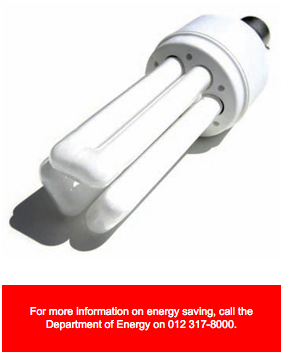 Benefits for the people
Benefits for the people
When the World Bank decided to grant Eskom the R32 billion loan, it based its decision to support the loan for the benefits for South Africa's people. A power shortage would have a negative effect on the people, the economy and the entire Southern African region.
The loan is important as it will ensure that there will be no more power cuts in South Africa once the new coal-fired power station starts working.
CHANGE TO LOW ENERGY BULBS
Eskom is encouraging people to save energy by replacing energy-consuming light bulbs with energy-saving bulbs. To help households save energy, Eskom is distributing energy-saving bulbs free of charge, especially in poor areas where people are struggling to survive.
Installers appointed by Eskom are visiting homes to replace energy-consuming bulbs. Energy-saving bulbs, also called energy-efficient bulbs, last six times longer than normal bulbs and use five time less electricity than the normal bulbs.
For security reasons, people are asked to look for an Eskom identity card before allowing anybody who claim they are from Eskom into their homes.
Tips for saving energy in the home
- Geyser: Your geyser uses 39 per cent of your monthly energy usage. Switch it off to save energy. Don't forget to insulate the geyser and water pipes.
- Shower: Take a shower instead of having a bath; showering uses less water than bathing. It uses less hot water which means less work for your geyser.
- Lighting: Replace all your bulbs with energy saving bulbs, also called Compact Fluorescent Lamps (CFL). Remember to switch lights off in rooms that are not being used.
- Stand-by electricity: Don't leave your TV, DVD player and other appliances on stand-by mode. They still use up to 50 per cent of their operating power. Rather switch the power button off or unplug the appliance.
- Cellphones: Don't forget to unplug your cellphone charger after your phone has been charged; it will continue to use power if left in the power socket.
- Refrigeration: Close your fridge door quickly so it doesn't use extra power to get back to its normal cooling level. Also ensure that fridge and freezer doors are properly sealed to prevent cool air escaping.
Remember the golden rule that applies to saving electricity in the home or office: If you're not using it, switch it off.
NATIONAL ORDERS RECOGNISE EXCELLENCE
NATIONAL ORDERS RECOGNISE EXCELLENCE sadmin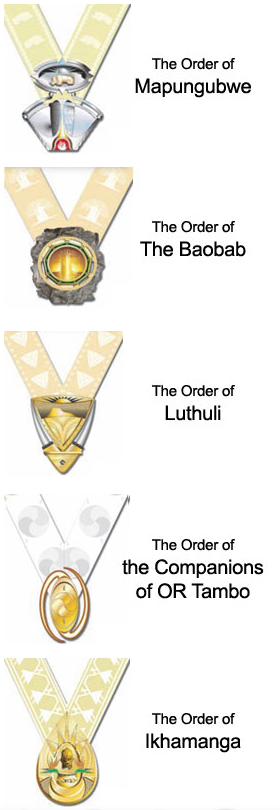 The National Orders are the highest awards that a country, through its President, presents to its citizens and to foreign nationals. The President is assisted by the Director-General in The Presidency, who is the Chancellor of National Orders.
The National Orders are the highest awards that a country, through its President, presents to its citizens and to foreign nationals. The President is assisted by the Director-General in The Presidency, who is the Chancellor of National Orders.
The following South Africans and foreign nationals were awarded National Orders at the 15th awards ceremony held on Freedom Day, 27 April 2010. These people have contributed towards the progress of democracy and made major contributions towards improving the lives of South Africans. Below are the images of orders, description and names of recipients of this orders.
The Order of Mapungubwe
The Order of Mapungubwe is given to South Africans for excellence and exceptional achievements.
Bronze: Monique Zaahl
Silver: Douglas Stuart Butterworth, Johan RE Lutjeharms
The Order of the Baobab
The Order of the Baobab for distinguished service is given to South Africans who have contributed to community service, business and economy, science, medicine and technological innovation.
Silver: Malebone Susan Luthuli, Malefu Mphathane, Imtiaz Sooliman, Vincent Naidoo
Gold: James Mata Dwane
The Order of Luthuli
The Order of Luthuli is given to South Africans who made a special contribution to the struggle for democracy, nation building, human rights, justice and peace and conflict resolution.
Silver: Sonia Beryl Bunting, Dorothy Cleminshaw, Nongolozi Jameson Mngomezulu, Jabulani Nobleman "Mzala" Nxumalo, James Randolph Vigne
Gold: Stephen Dlamini
The Order of the Companions of OR Tambo
The Order of the Companions of OR Tambo is awarded to heads of state and other dignitaries for promoting peace, cooperation and friendship towards South Africa.
Silver: Vernon Berrange, George Houser, Lord Joel Joffe, Herbert and Joy Kaiser, Sadako Ogata
Gold: Joseph Sepp Blatter, President José Eduardo dos Santos, Issa Hayatou, Jacque Rogge
The Order of Ikhamanga
The Order of Ikhamanga is given to South Africans for outstanding achievements in arts, culture, literature, music, journalism and sport.
Silver: Ernst van Dyk, Grant Khomo, Peki Emelia Mkhwebane, Makana Football Association, Winston Ntshona, Percy Tseliso Qoboza
Gold: Jonas Gwangwa, Hugh Masekela
The Order of Mendi for Bravery
The Order of Mendi for Bravery is given to South Africans who have performed outstanding acts of bravery that placed their lives in great danger, or who lost their own lives in trying to save the life of another person, or by saving property, in or outside the Republic of South Africa.
Silver: Phila Portia "Zandi" Ndwandwe
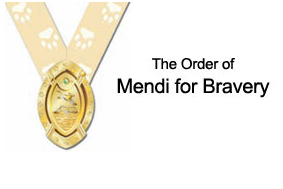 Gold: Harry Themba Gwala, Kgosi Galeshewe, Makhosi "Tholi" Nyoka, the G5 Unit.
Gold: Harry Themba Gwala, Kgosi Galeshewe, Makhosi "Tholi" Nyoka, the G5 Unit.
For more information on National Orders, call the Chancery on: 012 300-5423, or send an e-mail to dunyiswa@po.gov.za
YOUR HEALTH TOBACCO CAN KILL
YOUR HEALTH TOBACCO CAN KILL sadmin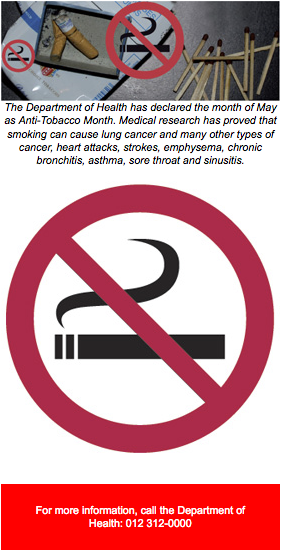 Tobacco is a product of the leaves of the 'nicotiana' plant. It is used in things like cigarettes and cigars, hand-rolling tobacco, pipe tobacco, chewing tobacco and snuff.
Tobacco is a product of the leaves of the 'nicotiana' plant. It is used in things like cigarettes and cigars, hand-rolling tobacco, pipe tobacco, chewing tobacco and snuff.
It is said that nicotine, which is the substance found in tobacco, is one of the most addictive of all drugs. It is poisonous in large doses and is sometimes even used in insecticides.
Chemicals
People who smoke increase their risk of dying from lung cancer 22 times more than non-smokers and from bronchitis and emphysema 10 times more.
Every time you inhale smoke from a cigarette, small amounts of these chemicals get into your blood stream through your lungs. They travel to all parts of your body and cause harm. Smoking makes you smell bad, gives you wrinkles, stains your teeth and gives you bad breath.
Immune system
Smoking also affects your immune system. This means that when you are sick, it will take you longer to recover from illnesses, colds and flu. Teenage smokers have smaller lungs and weaker hearts than non-smokers and also get sick more often than non-smoking teenagers.
Every time you inhale smoke from a cigarette you kill some of the air sacks in your lungs called alveoli. This is where the oxygen you breathe in is sent to your blood. Alveoli do not grow back, so when you destroy them you have permanently destroyed part of your lungs. This can affect your breathing and doing well in sports, dancing or singing.
Stop smoking
When you decide to stop smoking, it will help a lot if you change your lifestyle and your eating habits.
Leading a healthy lifestyle and eating healthy, nutritional food will restore the balance in your body and boost your immune system.
Fruit, vegetables and proteins will help to put back the minerals, vitamins and nutrients your body lacks from smoking. Protein is very important and is found in fish, poultry, pork, lamb, beef, cheese and eggs. Avoid white sugar and flour products like sweets, pastries, biscuits and sweet drinks. Avoid deep fried foods and oil.
Don't give up!
When you stop smoking you will find yourself feeling very uneasy because you have to get used to being without nicotine. This will pass as your body adapts. Whatever you do, once you've decided to stop smoking, stick with your decision and don't give up - just think about the benefits of not being addicted to tobacco!
Eat celery or carrot sticks, chew bubblegum, take deep breaths and drink lots of water. There are also nicotine patches and special bubblegum that will make it easier for you to stop.
Ask your family and friends to support you. Speak to your doctor or clinic for more information about how to stop smoking.
- Samona Murugan